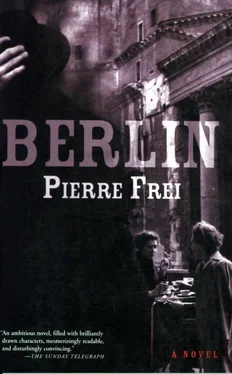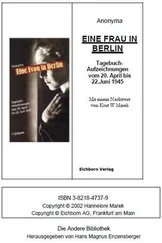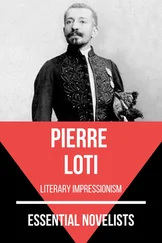A man called Gleim came to see Detta in her office. She had seen him in the building several times, but he was not a member of the consulate staff. His Panama hat and bamboo cane gave him the look of a Cuban tobacco planter. He came straight to the point. 'Fraulein von Aichborn, it's come to our knowledge that you are meeting the Englishman David Floyd-Orr. We know that this is a private relationship dating back to before the war, and no one holds it against you.'
She did not let her surprise show. 'How am I supposed to take that?'
'Your friend wasn't posted to Barcelona just by chance, as he let you think. His meeting you was even less of a coincidence. Captain Floyd-Orr is a member of the British Intelligence Service.'
Everything went round in circles. All of a sudden, the fact that David knew about her appointment as vice-consul and Papa's military rank made terrible, logical sense. He had been sent to get information out of her, and she, poor unsuspecting lamb, was so in love that she hadn't suspected.
She remained calm. 'Thank you for telling me, Herr Gleim.'
'Lieutenant-Colonel Gleim, Counter-Intelligence, if I may. Have you and your friend discussed any subject that might be of significance to the other side? In all innocence, obviously.'
'No. But Captain Floyd-Orr made a harmless excuse for taking an interest in the date of Sealion. He wants me to ask my father about it when I'm in Berlin next week.'
The lieutenant-colonel nodded, pleased. 'Excellent. You will take your friend the information he wants.'
'I'm not a traitor, and I won't even pretend to be. Please don't count on me to do it.'
Her visitor stood up. 'Well, it's a pity if you won't help us, but I understand your motives. I will just ask for one thing — your silence.'
Detta retained her aristocratic Prussian poise. As I have said already, I am not a traitor. Goodbye, Herr Gleim.' The lieutenant-colonel left the room. When he had closed the door, she collapsed in sobs.
'I'm afraid Carlos isn't an invention after all,' she told David that evening.
'Nor is Conchita.'
'Goodbye, David.'
'This damned war will destroy us all,' he said in a flat voice, and left.

Detta suppressed all thoughts of David, immersing herself in work. She turned the entire filing system of her passport department upside down and set about reorganizing it, a job as unnecessary as it was boring. In her free time she tried her hand at a translation of Calderon's The Lady Phantom and went to Frau Kessler's bridge parties. Tom Glaser called regularly when he was in Barcelona, and they went out to eat together. She went to Madrid to visit Uncle Juan and the rest of the Alvarez de Toledo family, who wanted to marry her off to a Spanish grandee. The young man concerned told her tearfully about his love for the gardener at his palace. Lady Chatterley in reverse, thought Detta.
Miriam came on a flying visit from Lisbon. She had grown a little plumper, was married to an American banker and had two children. 'We're flying home next week. Do come to America with us. Bill can fix it for you. He has good connections with the State Department.'
'Not homesick for the Kurfiirstendamm any more?' Detta couldn't help asking.
'You must be joking,' said Miriam.
Detta spent her annual vacation at home as usual. So much had changed at Aichborn. All men 'able to bear arms' were fighting at the Fronts, which were falling back. Their wives did almost all the work at home. Townsfolk who had fled from the air raids populated the estate, and ladies in high heels made their way through the muck, laying themselves open to mockery and derision. Frau von Aichborn had difficulty keeping the peace. In addition, the foreign labourers had to be protected from Fanselow, the district farmers' leader, who particularly liked harassing the Poles when he was at Aichborn.
Today he had his sights set on the Polish groom. Jurek was just harnessing up 'Loschek', as he affectionately called the old horse that pulled the muck cart. 'Get a move on, you damn Polack.' Fanselow snatched the whip from its place on the cart.
Detta came between them, holding out the basket full of eggs she had just been collecting. 'Oh, please, Herr Fanselow, would you take these to my mother in the kitchen? Thanks, that's very kind of you.' Surprised, Fanselow put the whip down and took the basket. Jurek's brown eyes looked gratefully at Detta.
The Baron was sceptical and silent when he came home from his desk job at Army High Command one February day in 1943. The truth about what had been described as the heroism of the German Army in its defeat at Stalingrad had filtered through. 'No one's going to get us out of this mess now,' was one of his few observations, which were made grimmer by their scarcity.
Hans-Georg, on leave from Paris, was more talkative. 'There's no doubt of it, Hitler must go,' he told his sister as they rode in the snow-covered park together. 'Only a government formed from the best conservative forces in the country can bring us an honourable peace. The Allies have already agreed not to exploit any confrontation within Germany for their own military ends.'
'The man will never go voluntarily,' said Detta.
A bullet at close quarters will solve that problem,' said the newly appointed cavalry captain with conviction. 'Luckily, some comrades who have access to him are willing to risk all. Oh, Detta, I wish I was among those select few.'
She heard the enthusiasm and determination in his voice, and felt glad he was not. Thank goodness he's not in the firing line in Paris, she thought with relief, spurring her horse on.
Detta received the message in April 1945. Someone had pushed it under the door of her apartment by the harbour. Captain David Floyd-Orr, serving with his special unit, had fallen to his death on the steep coast of Normandy three years earlier. She did some arithmetic. He must have volunteered for this suicide mission just after they parted. She could hear him saying, 'I get vertigo even standing on a kitchen stool.'
You fool, she thought, you dear. dear fool. A wave of tenderness swept over her.
Her boss had work for her that morning, which took her mind off things. The consul-general pointed to an elegant crocodile case bearing the initials F.M. 'Sent to us by the Foreign Ministry. Its owner died a few days ago in an air raid on Berlin: Fernando Mendez, a Spanish diplomat. He and the case were dug out of the ruins of a house on the banks of the Lietzensee, where he'd been spending the night with his girlfriend. Among the few items retrieved was a letter from his parents in Barcelona. Hand it all over to Senor and Senora Mendez, and express condolences from the government of the German Reich,' Dr Kessler told his vice-consul.
So now the case stood open on Detta's desk, and she set about making a list of its contents; she would be asking for a receipt in line with regulations. Blue and white striped silk pyjamas, washing and shaving things, the dead man's diplomatic pass, a half full travel flask of cognac, his parents' letter, and a bar of Sarotti bitter chocolate which had been broken into. She discreetly disposed of a packet of condoms and picked up the phone to arrange her visit. The cleaning lady answered: Senor and Senora Mendez were at their daughter's house in the country.
Detta put the case away in the filing cabinet and turned to some papers. Shaking her head, she read an application from one Federico Vargas for a visa to Germany. This lively little man had already visited her office several times. He was keen to get to Cologne and make business contacts for the future. 'Eau-de-Cologne always sold well here before the war,' he had assured her.
'Rejected!' she wrote right across the application, adding, with more than a touch of sarcasm: 'We recommend the applicant to turn to the British Consulate, now responsible for Cologne and the surrounding area.' She couldn't help smiling. David would have liked that. Then grief got the upper hand again.
Читать дальше













